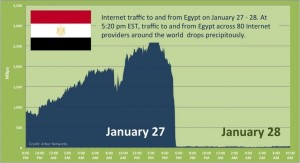Internet Filtering in the Jasmine Revolution
 As protests and unrest continue to destabilize the Middle East and North Africa, the effects of these popular revolutions have predictably affected Internet access in these countries. Below is a list of recent filtering measures implemented by governments who continue to face opposition from their citizens.
As protests and unrest continue to destabilize the Middle East and North Africa, the effects of these popular revolutions have predictably affected Internet access in these countries. Below is a list of recent filtering measures implemented by governments who continue to face opposition from their citizens.
Internet traffic from Libya has been following a curfew pattern, according to CNET, who reports that browsing patterns are 60-80% below normal. YouTube traffic from Libya fell 90% form normal levels. With only one state-owned telecom company who provides service to the country, Libya has been subject to sporadic outages in late February.
Bahrain’s Internet has been clamped down by the government, says researchers at Arbor Networks which monitors Internet traffic internationally. Data collected in February showed that traffic was down 10-20%. Berkman Center ONI Project Coordinator Jillian York was quoted by The New York Times, testifying to the prevalent blocking practices in the country, citing YouTube as an example.
Kazakhstan telecom companies have taken down certain websites as the country gears up for its April presidential election. Radio Free Europe/Radio Liberty reported that their website could not be accessed by its Kazahk bureau. “All of our sites were inaccessible, with short breaks of 15-20 minutes when there was access,” said RFE/RL’s Yedige Magauin. “Those ‘breaks’ repeatedly happened almost every 40-60 minutes.”
Algeria experienced a complete shutdown of the Internet on February 12. In attempts to diffuse organization by eliminating access to social networking sites, the government has even gone so far as to delete Facebook accounts, according to accusations reported by The Telegraph UK. Coordinator for Democratic Change in Algeria Rachid Salem also pointed his finger at the Algerian regime—”The government doesn’t want us forming crowds through the Internet… There are reports of this across Algiers, and Annaba, and other parts of the country. The government is clearly behind this.”
The Huffington Post published a graph showing the Internet blackout in Egypt at the end of January, when at around 5:20pm eastern time on January 27, Internet traffic between the nation and other ISPs dropped to almost zero.
Reporters Without Borders posted an online report on February 15 on the Iranian regime’s actions on Internet filtering, including the disruption of mobile use and text messaging. It also reported that broadband speeds slowed considerably in major cities around the country.